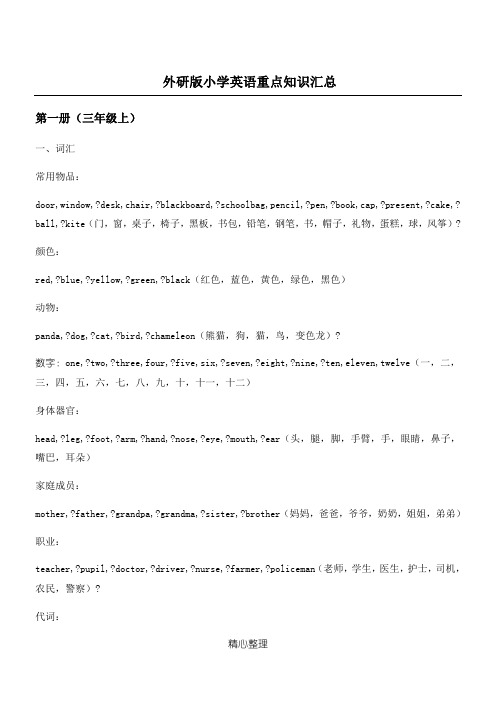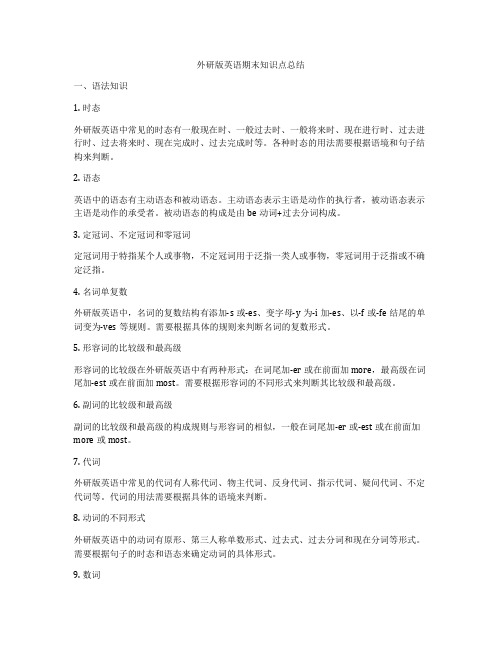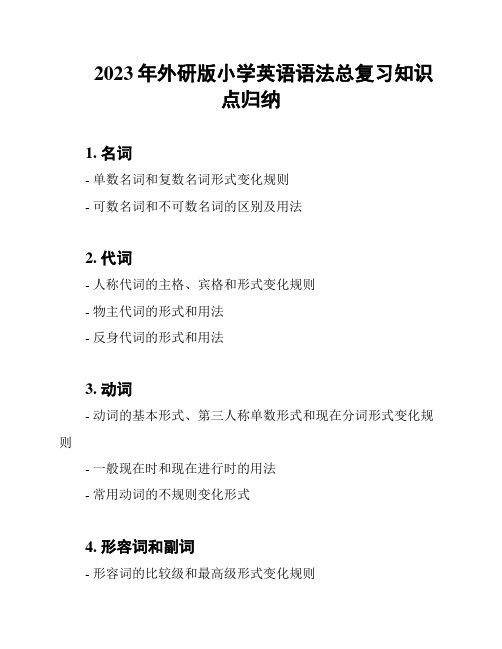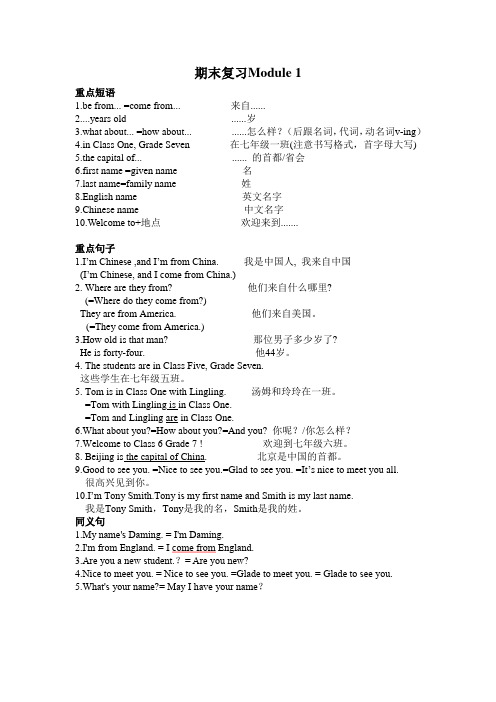外研社英语(基础模块)第一册期末复习总结
(完整word版)外研版小学英语语法总复习知识点归纳

(完整word版)外研版小学英语语法总复习知识点归纳外研版小学英语语法总复知识点归纳一、时态1.一般现在时(1)表示经常发生的动作或事情,通常用“usually通常,often常常,every…每…。
sometimes有时,always总是,”等词。
(2)基本结构:主语I / You / We / They /He / She / It肯定句:主语+动词原形或动词第三人称单数形式否定句:主语+don’t + 动词原形或者doesn’t + 动原一般疑问句(Yes/No) Do…。
Yes。
I do.No,I don’t.Does…(动词原形)…?Yes,he/she does。
No,he/she doesn’t.特殊疑问句What do …。
How does she…(动词原形)…?(3)动词第三人称单数方式(同名词单数酿成复数办法不异)1.普通情形+s如:walk-walks2.辅音字母+y结尾去y +ies fly-flies3.结尾是s。
x,sh。
ch +es watch-watches4.结尾是0 +es do-does。
go-goes5.特殊have-has2.现在进行时(1)表示正在发生的动作,通常用“now现在。
look看,XXX听”.(2)根本方式: be +动词-ingeg: I am(not) XXX.You/We/They are(not) reading。
He/She/It is(not) eating.What are you doing。
Is he reading?(3)动词的目前分词方式(动词+ing)普通情形+ing walk—walking末端是不发音的e-e+ingcome—coming重读闭音节双写末了一个字母+ingswim-swimming。
run-running3.一般过去时(1)表示过去已经发生的事情,通常用“last …上一个…。
just now刚才,many years ago许多年前,XXX昨天”等词。
外研社一年级英语上册知识点总结

外研社一年级英语上册知识点总结一、字母和发音1. 字母表:在学习英语的过程中,我们首先要掌握字母表。
字母表是英语的基础,熟练掌握字母表可以帮助我们更好地学习发音和拼写单词。
在外研社一年级英语上册中,我们学习了26个字母的拼写和发音,通过反复练习,我们能够熟练掌握这些字母的发音规则。
2. 发音:外研社一年级英语上册还对字母的发音进行了详细的介绍。
通过学习,我们能够正确地发出每一个字母对应的音标,并能够准确地听、说、认读这些字母。
二、单词和句型1. 常见的日常用语:在学习英语的过程中,我们需要学习一些常见的日常用语,比如问候语、介绍自己等。
外研社一年级英语上册中包含了丰富的日常用语,通过学习这些内容,我们能够在实际生活中更好地运用这些语言表达。
2. 常用的简单句型:外研社一年级英语上册还介绍了一些常用的简单句型,比如主语+动词的基本句型结构。
通过学习这些句型,我们能够初步掌握英语句子的构成规律,并能够运用这些句型进行简单的交流。
三、语音和文化1. 语音:语音是学习英语的重要组成部分,外研社一年级英语上册中对一些常见的语音进行了详细的介绍,比如元音、辅音等。
通过学习这些内容,我们能够更准确地发出英语中的各种语音,提高我们的口语表达能力。
2. 文化:外研社一年级英语上册还介绍了一些英语国家的文化习俗,比如英国的传统节日、美国的风土人情等。
通过学习这些内容,我们不仅可以提高我们对英语国家文化的了解,还能够培养我们的跨文化交际能力。
总结:通过外研社一年级英语上册的学习,我们不仅能够掌握英语的基础知识,还能够在实际生活中运用这些知识进行交流。
通过学习英语,我们还能够提高我们的跨文化交际能力,增进对英语国家文化的了解。
在未来的学习中,我们应该继续加强对英语基础知识的学习,并努力提高我们的语言表达能力。
外研社一年级英语上册知识点总结四、词汇和语法1. 常见的单词:外研社一年级英语上册中包含了一些常见的单词,比如家庭成员、动物、水果、颜色等。
外研版(三年级起点)小学英语总复习资料

外研版小学英语重点知识汇总第一册(三年级上)一、词汇常用物品:风筝)? 颜色:动物:数字:mother,?father,?grandpa,?grandma,?sister,?brother(妈妈,爸爸,爷爷,奶奶,姐姐,弟弟)职业:teacher,?pupil,?doctor,?driver,?nurse,?farmer,?policeman(老师,学生,医生,护士,司机,农民,警察)?代词:I,?you,?it,?me,?he,?she,?your,?my,?his,?her,?this,?that(我,你,它,我,他,她,你的,我的,他的,她的,这个,那个)?二、句型?1、打招呼及问好:Hello!(你好)??Hi!(你好)Byebye.Thanks!----I’m?fine,?thank?you.(我很好,谢谢你。
)祝别人生日快乐说:Happy?birthday!?(生日快乐!)给别人东西时说:Here’s?your?present.?(给你的礼物。
)2、询问姓名:----What’s?your?name??----I’m?+姓名。
例句:----I’3It’It’例句:It’It’4How?many?+(名词复数)?例句:----How?many?boys??(多少个男孩?)----Twelve?boys.(12个男孩。
)----How?many?red?caps??(多少顶红色的帽子?)----One?red?cap.?(一顶红色的帽子)5、询问年龄:----How?old?are?you??----I’m?+年龄例句:----I’6----It例句:----It----It7This?is?my?+?物/人。
例句:This?is?my?school.(这是我的学校。
)That?is?my?classroom.(那是我的教室。
)This?is?my?English?teacher.?(这是我的英语老师。
外研版英语期末知识点总结

外研版英语期末知识点总结一、语法知识1. 时态外研版英语中常见的时态有一般现在时、一般过去时、一般将来时、现在进行时、过去进行时、过去将来时、现在完成时、过去完成时等。
各种时态的用法需要根据语境和句子结构来判断。
2. 语态英语中的语态有主动语态和被动语态。
主动语态表示主语是动作的执行者,被动语态表示主语是动作的承受者。
被动语态的构成是由be动词+过去分词构成。
3. 定冠词、不定冠词和零冠词定冠词用于特指某个人或事物,不定冠词用于泛指一类人或事物,零冠词用于泛指或不确定泛指。
4. 名词单复数外研版英语中,名词的复数结构有添加-s或-es、变字母-y为-i加-es、以-f或-fe结尾的单词变为-ves等规则。
需要根据具体的规则来判断名词的复数形式。
5. 形容词的比较级和最高级形容词的比较级在外研版英语中有两种形式:在词尾加-er或在前面加more,最高级在词尾加-est或在前面加most。
需要根据形容词的不同形式来判断其比较级和最高级。
6. 副词的比较级和最高级副词的比较级和最高级的构成规则与形容词的相似,一般在词尾加-er或-est或在前面加more或most。
7. 代词外研版英语中常见的代词有人称代词、物主代词、反身代词、指示代词、疑问代词、不定代词等。
代词的用法需要根据具体的语境来判断。
8. 动词的不同形式外研版英语中的动词有原形、第三人称单数形式、过去式、过去分词和现在分词等形式。
需要根据句子的时态和语态来确定动词的具体形式。
9. 数词外研版英语中的数词包括基数词和序数词。
基数词用于表示数量,序数词用于表示顺序。
需要根据具体的语境来选择正确的数词形式。
二、词汇知识1. 动词短语外研版英语中常见的动词短语有动词+副词、动词+介词、动词+名词等。
动词短语的构成需要根据具体的动词和其后面的搭配来确定。
2. 名词短语外研版英语中常见的名词短语有名词+名词、名词+介词、名词+形容词等。
名词短语的构成需要根据具体的名词和其后面的搭配来确定。
外研版小学英语册知识点复习及语法

外研版小学英语1~8册学问点复习及语法第1册主要内容1、26个字母〔听、说、读、写过关〕:A B C D E F G H I J K L M N O P Q R S T U V W X Y Za b c d e f g h i j k l m n o p q r s t u v w x y z词汇:boy girl door window blackboard bird desk chair red blue yellow green black dog cat cap panda one two three four five six seven eight nine ten eleven twelve school teacher bag pencil pen book cake kite mother father grandpa grandma sister brother doctor driver policeman nurse farmer head arm leg foot nose eye mouth ear句子:1----Good morning! ----Good morning!2----Good afternoon! ----Good afternoon!3----How are you ----I’m fine, thank you.4----What’s your name ----I’m …. / My name is ….----Point to the door/window/blackboard…..----Stand up/ Sit down, please.----What colour… ----It’s red/blue….5----How many …----One/Two/Three….6----What’s this/that ----It’s a chair/desk…----Happy birthday! ----Thank you.---- Here’s your present/cake. ----Thank you.7----How old are you ----I’m nine.8----Is it a cat ----Yes, it is. / No, it isn’t.----Where’s the cat ---I don’t know./ It’s in the green bag.9---- This is my father.----He/She’s a doctor/nurse…. \10---- This is his/ her arm/head….第2册主要内容词汇:song toy car ship doll animal monkey tiger lion elephant big small fat thin tall short sport football basketball table tennis riding bikes swimming skipping meat rice noodles fish milk banana pear orange apple Chinese Maths Science Music Art PE play sleep sing give eat Christmas spring summer autumn winter hot warm cool cold sunny windy dress coat sweater T-shirt bike bus walk in on under park词组:get up go to school have lunch go home watch TVgo to bed have breakfast have dinner Spring Festival New Year fly kites go to work by bus by bike go fishing句子:My favourite toy is a car/ doll….1 ----What’s this/that ----It’s a tiger.2 ----What are they ------ They’re lions.3 I like/ don’t like football/ basketball….I like/ don’t like swimming/skipping….4----Do you like meat ----Yes, I do./ No, I don/t.5----Does Daming/he/ she like bananas -----Yes, he does./ No, she doesn’t.I get up at seven o’clock.----What’s the time, please ---- It’s half past seven.----What do you do at the weekend ----- I play football.----What does he/she do at the weekend ---- He/ She watches TV.Happy New Year.It’s spring/ summer/ autumn/ winter.6 ---It’s warm/hot/cool/cold in spring/summer/ autumn/ winter.I’ve got a new book.7----Have you got a new book--- Yes, I have. / No, I haven’t.----Has Tom/he/she got a new book ----Yes, he/she has. / No, he/she hasn’t.8 ---Amy/ He/ She goes to school by bike/ by bus/by car.I t’s in/ on/ under the desk….第3-4册主要内容一、情境问答:第三册1. Have you got_______ Yes, I have. No, I haven’t.2. Excuse me. Where’s the________, pleaseGo straight on. Turn right. Turn left.3. What are you doing I’m _______What is he/she doing He’s/She’s ___________What are they doing They’re __________4. Do you want some _______ Yes, please. No, thank you.5. Can you _____ Yes, I can. No, I can’t.6. What are you going to do I’m/We’re going to _______7. Can I have some ______ Yes, you can. Sorry, you can’t.8. How many ____ are there in ____ There is/are______第四册9. Is it _____ Yes, it is. No, it isn’t.10. Will you _____ Yes, I will. No, I won’t.11. Was he/she/it _____ Yes, he/she/it was. No, he/she/it isn’t.Were you ______ Yes, I was. No, I wasn’t.12. Did you/he/she/they____ Yes, I/he/she/they did. No, I/he/she/they didn’t.二、词组短语第三册take pictures watch TV read a book make a cake write a letter listen to music talk to my friend do the high jump play with in the park look at do the long jump row a boat under the tree play chessplay football play basketball play table tennis第四册have a picnic go swimming go to the park do homework speak English 情景运用:第三册1. 问路、指路Excuse me. Where’s the _______, pleaseGo straight on. / Turn left. / Turn right.What are you doing I’m _______What is he/she doing He’s/She’s ___________What are they doing They’re __________3. 询问对方是否要吃某种食物Do you want some _______ Yes, please. No, thank you.4. 询问对方的实力Can you _____ Yes, I can. No, I can’t.5. 议论将要做的事情What are you going to do I’m/We’re going to _________6. 向别人要东西吃Can I have some ______ Yes, you can. Sorry, you can’t.第四册7. 介绍某人This is_______8. 议论周一至周日将要做的事What will you do on Monday I’ll_______ on MondayWill you ______ on Monday Yes, I will. No, I won’t.9. 做天气预报It will be hot/cold/sunny/windy. It will snow/rain.10. 做比较如: Sam is older than Daming.第5-6册主要内容1 e back st Sunday/night/year 3.go home 4.go to school 5.go to the park 6.hurry up 7.in a hurry 8.wait for 9.make a list 10.shopping list 11.half a kilo 12.how many 13.how much14.at the weekend 15.in the morning 16.in the afternoon 17.take a photo18.take photos 19.the British Museum 20.Big Ben 21.the Great Wall22.the London Eye 23.give out 24.be careful 25.too many 26.run fast 27.play football 28.half past seven 29.get up 30.sit down31.stand up 32.do morning exercises 33.play chess 34.on the farm 35.all day 36.of course 37.go out 38.say hello to 39.play basketball40.play table tennis 41.many years ago 42.ten years ago 43.three days ago44. live in 45.a lot of=lots of 46.watch TV 47.how about=what about52.a Chinese teacher 53.by bus/plane/car/train/ship/bike55.at school /.at home 56.at the library57. library card 58.find out 59.be good at 60.look at 61.have /has got 62. in the east of China 63. in the west of China 64. in the south of China 65. in the north of China 66.every year/day 67.send an email68. a good idea 69.listen to 70.be read for句子:1.Did your grandma learn English Yes, she did. /No, she didn’t.2.What did she have for breakfast She had eggs and sausages.3.Where are the books about…They are on Shelf C.4.When did you go to…I went there in July.5.What about chopsticks It’s a good idea.6.Why don’t you give him a kite7.Did you…Yes, I did. /No, I didn’t.8.When did you come back We came back last Sunday.9.How many bananas do you want Six, please.10.How much chess do you want Half a kilo.11.Do you like…Yes, I do. /No, I don’t.12.Where did you go We went to the British Museum.13.What did you do at the weekend We visited lots of places.14.What’s the matter15.Whose bag is this It’s Ling ling’s.16.Is this your cap Yes, it’s mine.17.There be+ 某物+某地18.Can you…Yes, I can. /No, I can’t.19. What time do you get up I get up at half past six.第7-8册主要内容第七册1.These postcards are great! It’s a picture of the Great Wall. Tell me more about theGreat Wall. How long is it2.There’s a Chinatown in New York! There are lots of Chinese shops and restaurantsthere.3.I’ve got lots of stamps. These are some stamps from Canada. This stamp is fromChina.4.Thanksgiving is my favourite festival. We always have a special meal.5.Can you speak English Can I write to your friend6.Daming has got a Chinese kite and we fly it in the park. I’ve got some chopsticks,but they are difficult.7.Pandas eat for twelve hours a day.8.Do you often play with dolls Do you often clean your room9.Do you want to visit the UN building in New York10.Don’t talk in the library. Please stand in line.第八册1.What do you want to eat I want a hot dog, please. How much is it It’s thirteendollars and twenty-five cents.2.When are we going to eat We’re going to eat at half past twelve. It’s going to snowin Harbin.3.The sun is shining. The birds are singing in the trees. The ducks are eating ourpicnic.4.Who can help me Sorry, I can’t. I’m making Daming’s birthday card. I can help you.5.Daming is having a birthday party. Daming is playing the trumpet, but the phone isringing.6.I brought you this book. Who gave it to you Simon’s family gave it to me.7.Shenzhou V flew into space with Yang Liwei. He spent about twenty-one hours inspace. He made a video and now he is very famous.8.Helen Keller became blind and deaf. She couldn’t see and she couldn’t hear. Latershe could read and write. She wrote a book about herself.9.What’s the matter Why are you laughing Why are you wearing a raincoat Becauseit’s going to rain.10.Are you going to go to middle school this September Yes. I’m really excited. Whatare you going to study小学英语语法及习题一、名词复数规那么1.一般状况下,干脆加-s,如:book-books, bag-bags, cat-cats, bed-beds2.以s. x. sh. ch结尾,加-es,如:bus-buses, box-boxes, brush-brushes, watch-watches3.以“辅音字母+y〞结尾,变y为i, 再加-es,如:family-families, strawberry-strawberries 4.以“f或fe〞结尾,变f或fe为v, 再加-es,如:knife-knives5.不规那么名词复数:man-men, woman-women, policeman-policemen, policewoman-policewomen, mouse-micechild-children ,foot-feet, tooth-teeth,fish-fish, people-people, Chinese-Chinese, Japanese-Japanese 写出以下各词的复数I _________him _________this ___________her ______watch _______child _______photo ________diary ______day________ foot________ book_______ dress ________tooth_______ sheep ______box_______ strawberry _____thief _______ peach______sandwich ______man______ woman_______ paper_______ juice___________ water________ milk________ rice__________ tea__________二、一般如今时一般如今时根本用法介绍【No. 1】一般如今时的功能1.表示事物或人物的特征、状态。
2023年外研版小学英语语法总复习知识点归纳

2023年外研版小学英语语法总复习知识
点归纳
1. 名词
- 单数名词和复数名词形式变化规则
- 可数名词和不可数名词的区别及用法
2. 代词
- 人称代词的主格、宾格和形式变化规则
- 物主代词的形式和用法
- 反身代词的形式和用法
3. 动词
- 动词的基本形式、第三人称单数形式和现在分词形式变化规则
- 一般现在时和现在进行时的用法
- 常用动词的不规则变化形式
4. 形容词和副词
- 形容词的比较级和最高级形式变化规则
- 副词的基本形式和比较级形式变化规则
- 形容词和副词的用法区别及常见词汇
5. 冠词
- 定冠词和不定冠词的用法和区别
6. 介词
- 常用介词的用法及搭配
- 介词短语的常见用法
7. 连词
- 并列连词的用法和连接两个主语、谓语或宾语- 从属连词的用法和连接主句和从句
8. 句型和句子结构
- 简单句的基本结构和常见句型
- 复合句的构成和常见句型
- 句子成分的基本分类和识别方法
9. 时态和语态
- 一般过去时、一般将来时和一般过去将来时的用法
- 被动语态的构成和用法
10. 反义疑问句和特殊疑问句
- 反义疑问句的构成和用法
- 特殊疑问词的用法及回答方式
11. 直接引语和间接引语
- 直接引语的转述和标点使用
- 间接引语的构成和变化
以上是2023年外研版小学英语语法总复的知识点归纳,希望能对你的研究有所帮助。
外研社七年级上册期末复习Module 1知识点

期末复习Module 1重点短语1.be from... =come from... 来自......2....years old ......岁3.what about... =how about... ......怎么样?(后跟名词,代词,动名词v-ing)4.in Class One, Grade Seven 在七年级一班(注意书写格式,首字母大写)5.the capital of... ...... 的首都/省会6.first name =given name 名st name=family name 姓8.English name 英文名字9.Chinese name 中文名字10.Welcome to+地点欢迎来到.......重点句子1.I’m Chinese ,and I’m from China.我是中国人, 我来自中国(I’m Chinese, and I come from China.)2. Where are they from? 他们来自什么哪里?(=Where do they come from?)They are from America. 他们来自美国。
(=They come from America.)3.How old is that man? 那位男子多少岁了?He is forty-four. 他44岁。
4. The students are in Class Five, Grade Seven.这些学生在七年级五班。
5. Tom is in Class One with Lingling. 汤姆和玲玲在一班。
=Tom with Lingling is in Class One.=Tom and Lingling are in Class One.6.What about you?=How about you?=And you? 你呢?/你怎么样?7.Welcome to Class 6 Grade 7 ! 欢迎到七年级六班。
外研版英语必修一Module1重点知识总结

外研版必修一英语Module1Key Points & 单元测试题Ⅰ. Language Points1.倍数的表达方式: A is ⋯ times+as+adj.原 +as+B/A is ⋯times+adj.比 +than+BA is ⋯ times+the size/length/width/depth/height/weight of⋯2.否定移——反意疑A. 常否定移的表达:sb. don ’tthink/guess/believe/supposeB.反意疑遵循“一从二三主”原eg: I don ’tthink he is right,is he?You don ’tthink he is right,do you?He/She/Tom doesn ’tthink I am right,does he/ does she/ does Tom?3.–ing/-ed 形容区 a. -ing形容修物b.-ed形容修人(人所特有的五官face,look,voice,smile, expression也用 -ed来修)4.would you mind doing的回答介意— Yes, you ’d better not./ I prefer you not to do./ I’m sorry , but⋯不介意— No, of course not./ Certainly not./ Not at all./ Go ahead.5.倒装句——表情况相同She likes dancing, so do I .倒装句表情况相同She doesn ’tlike dancing, neither do I.She likes dancing, so she does.—正常序表“确是”6. take part in/ join in / join/ attendA. take part in参加群众性的、集体性的活,例如take part in school activities/ take part in the Olympic GamesB. join in参加正在行的活常用join sb. (in) doingC. join参加某个或体,例如,join the Party(共党) /join the league(共青)/ join the army(参)D. attend正式用,常指参加婚葬,会,典礼,上学,上等,例如,attend the wedding(婚礼) attend the funeral(葬礼)attendclass( 上 )attend school( 上学 )7. matter 的用法It doesn ’tmatter if⋯如果⋯没关系Does it matter if⋯如果⋯有关系?It matters a lot if⋯如果⋯很要Ⅱ . Key Phrasesat the start/ beginning of在⋯的开始 / 开端at the end of在⋯的末尾academic subject学科the attitude to/towards⋯的度in other words 句science/art subject理/ 文科take part in/ join/ join sb. (in) doing/ attend参加be far (away) from离⋯ be near to离⋯近divide sth. into = sth. be divided into把⋯划分behave in a polite way/method以礼貌的方式做事move to 搬到⋯look forward to doing期盼做某事 the method of doing sth.做⋯的方法feel/get/be bored with⋯感到倦nothing like不像,不如 ,没有什么比得上something like大,有点像impress sb with sth.Impress sth on sb.be impressed with某人⋯印象深刻introduce ⋯ to sb把⋯介⋯leave a deep impression on/ leave an unforgettable impression on⋯某人留下深刻印象 / ⋯某人留下忘的印象We have fun. 我玩得高make fun of逗by oneself/on one’s own独自用种方式: in this way in this manner with this method by this meansLook forward to sth/doing sth期待盼望⋯not a bit=not at all一点也不not a little=very much很,非常a bit/a little都可以写成 a little bitⅢ . Grammar ——————一般在1.常性、性作用一般在She goes to see the film once a week.He always/often/usually/sometimes/never/seldom talks with others.2.客律The teacher said that the earth travels around the sun.The light travels faster than sound.3.在 if 引的条件状从句中,主句用将来,从句用一般在,也就是“主将从”I will go to Xi’an if it doesn’train tomorrow.主将从4.一般在可以表将来(按刻表,日程表将要生的作或状)Ⅳ.Exercises:1.I got _____that Li Hong got full marks in the English examination, which was really_____.A. amazing; amazedB. amazing; amazingC. amazed; amazedD. amazed; amazing2.In order to change attitudes _____employing women, the government is bringing in new laws. A. aboutB. ofC. towardsD. On3.Your performance in the driving test didn't reach the required standard, _____, you failed.A. in the endB. after allC. in other wordsD. at the same time4.I mistook him for a taxi driver, ____, he is the CEO of General Motors.A. as a resultB. as a matter of factC. in a wordD. in the end5.The letter he had been looking forward to ____at last this morning.A. comeB. comesC. comingD. came6.The speech by the mayor of Shanghai before the final voting for EXPO 2010 is strongly impressed____my memory.7. In this seaside resort, you can ____all the comfort and convenience of modern tourism.A. enjoyB. applyC. receiveD. achieve8. The art show was____ being a failure; it was a great success.A. far fromB. along withC. next toD. regardless of9. The city is 1,500 kilometers ____ our village.A. far fromB. far away fromC. far awayD. away from10.Since taxi fare in the city may run____ twenty dollars, I suggest that you take a bus.A. as high asB. as expensive asC. so high asD. so expensive as11.The CDs are on sale! Buy one and you get _____completely free.A. otherB. othersC. oneD. ones12.We don't think it's a good plan,_____?A. isn't itB. is itC. don't weD. do we13.They didn ’ t believe that a hurricane was on the way, _____ ?A. do theyB. was itC. did theyD. wasn ’ t it14.Peter ’ s jacket looked just the same as Jack’ s, but it costs_____ his.A. as much as twice asB. twice as much asC. much as twice asD. as twice much as15.----Do you have enough to _____ all your daily expenses?---Oh yes, enough and to spare.A. coverB. spendC. fillD. offer16.---- How about the book you are reading?------Good indeed. It _____many problems we have come across in our study.A. saysB. talksC. coversD. refers17.Let ’ s go to _____cinema---that will take your mind off the problem for _____ while.A. the; heB. he;C. a; theD. a; a18.He _____the club and _____a lot of activities in his spare time.A.took part in; joinedB. joined; took part inC. joined; took a part inD. took part in;took part in19.He is very popular among his students as he always tries to make them_____ in his lectures. A.interested B. interesting C. interest D. to interest20.My parents always made me _____ about myself, even when I was twelve.A. feeling wellB. feeling goodC. feel wellD. feel good21.Bill wasn't happy about the delay of the report by Jason, and_____.A. I was neitherB. neither was IC. I was eitherD. Either was I22.-----My room gets very cold at night.------_____.A. So is mineB. So mine isC. So does mineD. So mine does23.My parents-_____in Hong Kong. They were born there and have never lived anywhere else. A. liveB. livedC. were livingD. will live24.Would you please keep silent? The weather report____ and I want to listen.A. is broadcastB. is being broadcastC. has been broadcastD. had been broadcast25.----The story the old man told was____.-----Yes, and very inspiring.A. disappointedB. disappointingC. touchedD. touching26. ____ and short of breath, Andy and Ruby were the first to reach the top of Mount Tai.A. to be tiredB. tiredC. tiringD. being tired27.I wonder if he ___ us, but I think we will be able to finish the work ahead of time if he ____us.A. help; helpB. will help ; helpC. helps; will helpD. will help; helpsdies and gentlemen, please fasten your seat belts. The plane_____.A. takes offB. is taking offC. has taken offD. took off29.This was such a _____film that we were all_____ to tears.A. moved; movedB. moving; movingC. moving;movedD. moved; moving30.The father as well as his three children _____skating on the frozen river every Sunday afternoon in winter.A. is goingB. goC. goesD. are going1—5 DCCBD6—10 DAADA11—15CBCBA16—20 CBBAD21—25 BCABD26—30 BDBC CⅣ . Everday English—How are you doing?=How is it going?某事进展的怎么样?—Fine./ Not bad.How is it going?=How are you?September through December 九月直到十二月Module2Ⅰ . Language Points1.with的用法A. with +宾语+ adj./ adv./介词短语a. with +宾语+ adj.Don ’ttalk with your mouth full.b. with +宾语+ adv.The room is bright with all the lights on.c. with +宾语+ 介词短语Ms. Liu comes into classroom with a book in her hand.B. with +宾语+ V. ( 看宾语和动词之间的关系)a.主—— ing The mother left, with the baby crying.b.被—— done He is sleeping with the window closed.c.没做— to do With so much homework to do, I can’tgo out.2. so ⋯that ⋯so thatA. so ⋯that ⋯如此⋯ 以致于⋯She explains English grammar so clear that even I can understand it.B.(1). so that引果状从句,“以至于”Mrs. Liu just smiles, so that you don’tfeel completely stupid.(2).so that引目的状从句,“ 了”。
- 1、下载文档前请自行甄别文档内容的完整性,平台不提供额外的编辑、内容补充、找答案等附加服务。
- 2、"仅部分预览"的文档,不可在线预览部分如存在完整性等问题,可反馈申请退款(可完整预览的文档不适用该条件!)。
- 3、如文档侵犯您的权益,请联系客服反馈,我们会尽快为您处理(人工客服工作时间:9:00-18:30)。
Welcome Unit1. 校园设施library 图书馆teaching building 教学楼student apartment 学生公寓office building 办公楼workshop 车间playground 操场basketball court 篮球场dining hall 食堂2. 数字zero one two three four five six seven eight nine ten0 1 2 3 4 5 6 7 8 9 10 eleven twelve thirteen fourteen twenty twenty-one11 12 13 14 20 21one hundred1003. 一周七天Sunday Monday Tuesday Wednesday Thursday Friday Saturday4. 12个月份January February March April May June July August September October November DecemberUnit 11. Words(单词)classroom 教室computer lab 电脑室(lab 实验室)factory 工厂dormitory 宿舍vocational school 职业学校machine 机器subject 科目skill-training class 技能训练课cookery 烹饪accounting 会计car-repair 汽车维修cashier 出纳员tour guide 导游secretary 秘书photography club 摄影社团pop music club 流行音乐社团dance club 舞蹈社团computer club 计算机社团2. Phrase(短语或词组)1) work as cashiers:做收银员的工作。
work as…:做…的工作这里的as意思是“作为”。
例:As a student, he is very hardworking. 作为一名学生,他非常努力。
2) Meet us on Fridays after school. 我们每周五放学后碰头。
on Fridays:每个周五,相当于every Friday。
3) Are you crazy about pop music? 你痴迷于流行音乐吗?be crazy about:对…疯狂3. Sentence(句子)1) We have our skill-training classes in a factory.我们在工厂里上技能训练课。
2) What subjects are you taking this term?你这学期都上什么课?3) Meet us on Fridays after school.我们每周五放学后碰头。
Unit 21. Words(单词)lonely 孤独的funny 有趣的cool 冷酷的sunny 快活的smart 聪明的friendly 友好的naughty 调皮的kind 亲切的helpful 乐于助人的quiet 安静的shy 害羞的waste 浪费understand 理解grown-up 成年人miss 想念;错过phone 打weekend 周末2. Phrase(短语或词组)1) be busy with : 忙碌于……2) have much time to do sth.:有很多时间做某事3) try one’s (my/ your/ his/ her/ their…) best:尽某人最大努力4) keep in touch with:与……保持联系5) chat with:与……聊天6) make friends:交朋友7) take care of:照顾3. Sentence(句子)1) My parents are both busy with their work.我的父母一直忙于工作。
2) They don’t have much time to talk with me.他们没有太多时间与我交谈。
3) She tries her best to keep in touch with them.她尽可能地与他们保持联系。
4) I want to make new friends. 我想结交新朋友。
5) People say communication is important for a happy family.人们都说,沟通对于一个幸福的家庭来说很重要。
6) It’s hard for me to say hello to strangers.与陌生人打招呼对我来说有点儿难。
*It’s … for sb. to do sth. 对sb.(某人)来说做某事是……的。
Unit 31. Words(单词)midnight 午夜hamburger 汉堡包vegetable 蔬菜health 健康teenager 青少年lose weight 减肥play badminton 打羽毛球play ping-pong 打乒乓球play tennis 打网球go hiking 作徒步旅行go swimming 去游泳go jogging 慢跑take a nap 打盹儿take a walk 散步2. Phrase(短语或词组)1) have (no) time to do sth. (没)有时间去做某事2) be good for:对……有好处3. Sentence(句子)1) But I have no time to play basketball now because I’m always too busy at work.但是我现在没有时间打篮球了,因为我的工作总是很忙。
2) Sleeping is good for our health.睡眠有益于我们的健康。
3) Amy usually gets up at 6:30 in the morning.Amy通常早上六点半起床。
4) I like playing ping-pong.我喜欢打乒乓球。
Unit 41. Words(单词)subway 地铁taxi 出租车traffic light 交通指示灯traffic jam 交通堵塞bus station 公共汽车站parking lot 停车场expensive 贵的inexpensive 不贵的cheap 便宜的crowded 拥挤的avenue 大道block 街区cross 穿过2. Phrase(短语或词组)1) be next to:在……旁边2) be opposite:在……对面3) on the corner of:在……拐角处3. Sentence(句子)1) The school is on Grand Avenue.学校在格兰德大街上。
2) The bank is next to the school.银行在学校旁边。
3) The bank is between the school and the park.银行在学校和公园之间。
4) The hospital is opposite the school.医院在学校对面。
5) The school is on the corner of First Street and Grand Avenue.学校在第一大街和格兰德大街的拐角处。
6) The subway is fast, cheap, and almost always on time.地铁速度快又省钱,而且大都很准时。
7) Buses are cheap, but often slow and crowded.乘坐公共汽车很便宜,但通常又慢又挤。
Unit 61. Words(单词)toothbrush 牙刷towel 毛巾soap 肥皂shampoo 洗发水chip 薯条daily 日常的celebrate 庆祝ticket 庆祝discount 打折delivery 配送online shopping 网上购物shopping mall 大型购物中心shopping list 购物清单2. Phrase(短语或词组)1) be interested in:对……感兴趣2) like sth. best:最喜欢某物3) like to do sth. for fun:喜欢以……为乐3. Sentence(句子)1) Mary is interested in hiking.Mary对徒步旅行感兴趣。
2) She likes pop music best.她最喜欢流行音乐。
3) He really likes to read for fun.他喜欢以阅读为乐。
4) I think this comic book would be his favourite.我想他最喜欢连环画。
5) You may even get a discount or free delivery for what you want.你甚至可以享受到折扣或者免邮的优惠。
Unit 71. Words(单词)dumpling 饺子sandwich 治pizza 披萨roast duck 烤鸭roast beef 牛排vegetable soup 蔬菜汤salad 沙拉starter 开胃菜main course 主菜dessert 甜点waiter 男服务员waitress 女服务员manager 经理2. Phrase(短语或词组)1) start with:以……为开始2) be famous for:因……而闻名3) deal with:处理3. Sentence(句子)1) I’d like the vegetable soup to start with.我想先来一份蔬菜汤。
2) It is famous for its pork dumplings.那里因它的猪肉水饺而闻名。
3) When there is a problem, I deal with it.出现问题时,我负责处理。
4) What would you like for the main course?您想点什么主菜?5) If you like Chinese food, you should visit John’s Shanghai House.如果你喜欢吃中餐,你可以到约翰的上海饭店试试。
6) For seafood lovers, the Brownstone House would give thema great treat.对于海鲜爱好者来说,棕石饭店会让他们大饱口福的。
